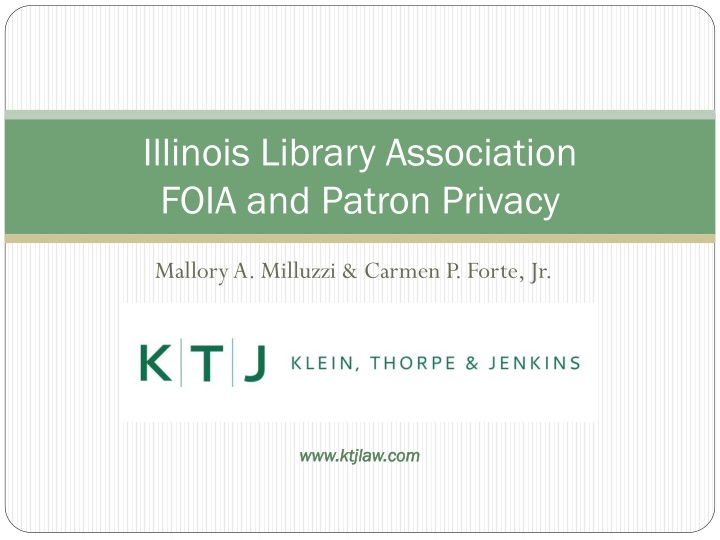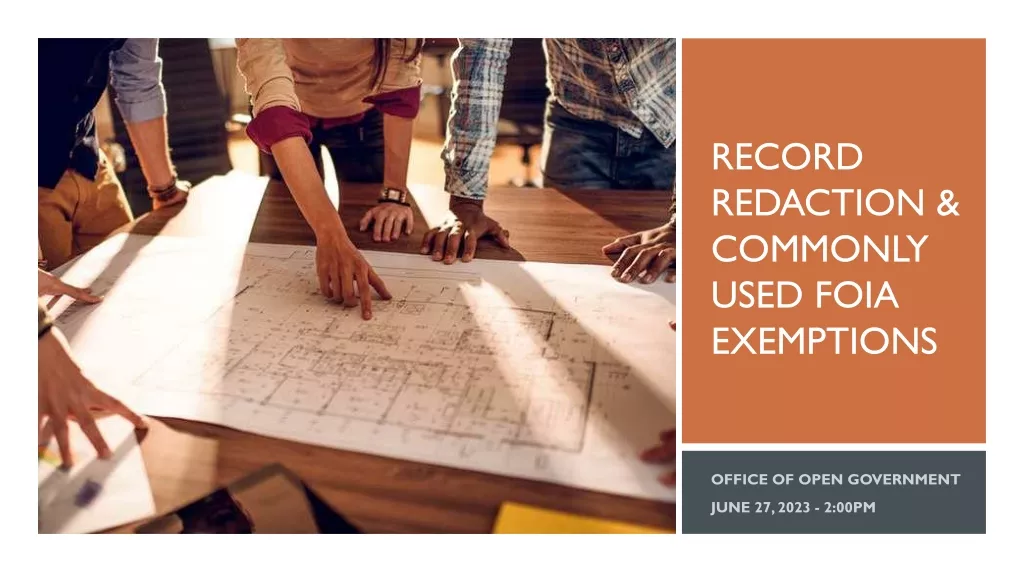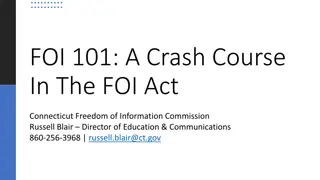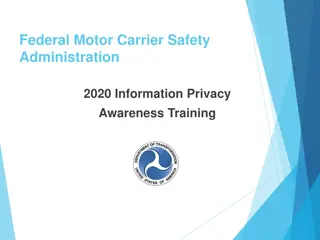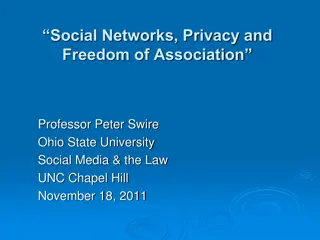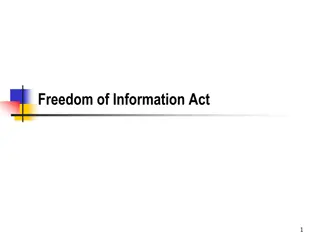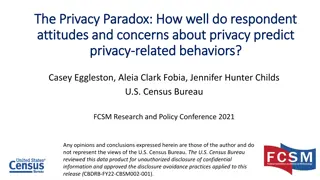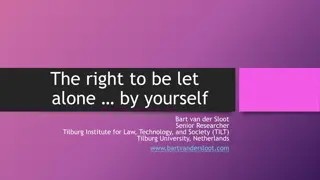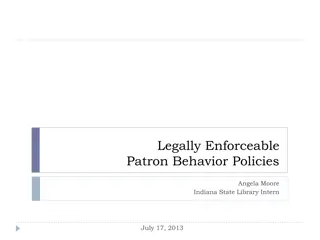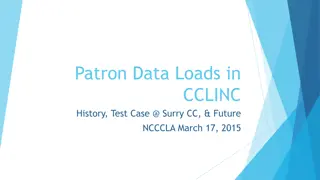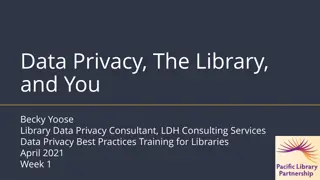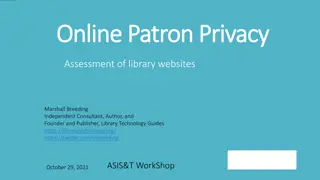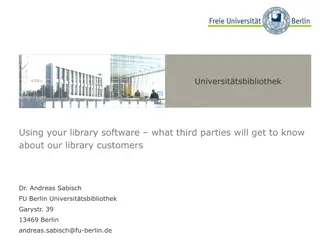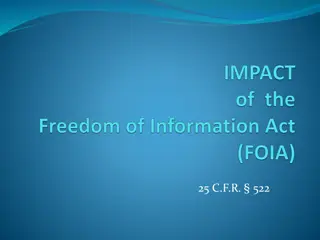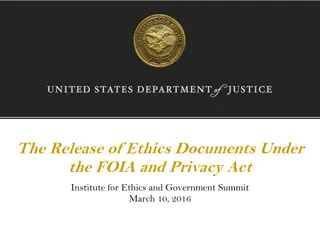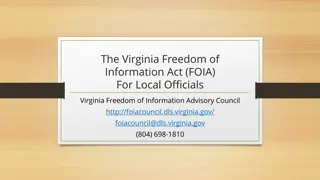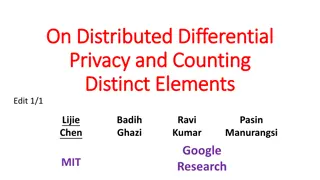Illinois Library Association FOIA and Patron Privacy
This content provides a detailed overview of the Illinois Library Association's procedures, policies, and responsibilities regarding Freedom of Information Act (FOIA) requests and patron privacy. It covers the FOIA process, responding to requests, public record exemptions, and more.
Download Presentation

Please find below an Image/Link to download the presentation.
The content on the website is provided AS IS for your information and personal use only. It may not be sold, licensed, or shared on other websites without obtaining consent from the author.If you encounter any issues during the download, it is possible that the publisher has removed the file from their server.
You are allowed to download the files provided on this website for personal or commercial use, subject to the condition that they are used lawfully. All files are the property of their respective owners.
The content on the website is provided AS IS for your information and personal use only. It may not be sold, licensed, or shared on other websites without obtaining consent from the author.
E N D
Presentation Transcript
Illinois Library Association FOIA and Patron Privacy Mallory A. Milluzzi & Carmen P. Forte, Jr. www.ktjlaw.com www.ktjlaw.com
Freedom of Information Act 5 ILCS 140, et seq. 2
Overview FOIA Procedure Outline of timeline Overview of responding to requests Unique types of requests What are Public Records FOIA Exemptions PAC Appeals 3
Policy Presumption in favor of openness with regard to public records. All records in the custody or possession of a public body are presumed to be open to inspection or copying. A public body that asserts that a record is exempt from disclosure has the burden of proving by clear and convincing evidence that it is exempt. 4
Procedure Procedure The FOIA Request The FOIA Request A request must be in writing. A Public Body cannot require use of its standard form. A Public Body cannot require the person making the request to specify the purpose for the request, except to determine whether the records requested are for a commercial purpose or whether to grant a fee waiver. A Public Body may honor oral requests, but it is not required to. A request can be delivered by any means. Personal delivery, mail, email, fax, or other. A request can be delivered to any person, so make sure that all FOIA requests are immediately forwarded to the FOIA officer A request can ask to inspect or copy records the requestor chooses 5
Procedure Analyze the FOIA Request Analyze whether the requestor is a recurrent requestor Analyze whether the request is voluminous, commercial or unduly burdensome Analyze and determine which department(s) will have responsive records Determine whether any/all of records are available on the Village s website Key timeframe five (5) business days 6
Responding to a FOIA- Five Business Days A Public Body must send a written response within five (5) business days: Fully respond to FOIA request & close out Extend time to respond to FOIA request Notify that requestor is a recurrent requestor Notify requestor that request is voluminous and/or unduly burdensome Only exception is a commercial request Failure to send this response will result in waiver of arguments & fees 7
Commercial Purpose Commercial Purpose Commercial Purpose - the use of any part of a public record in any form for sale, resale, or solicitation or advertisement for sales or services. Excludes requests made by the news media and non-profit agencies, as well as any scientific or academic organizations, when the principal purpose of the request is (1) to access and disseminate information concerning news and current or passing events; (2) for articles of opinion or features of interest to the public; or (3) for the purpose of academic, scientific, or public research or education Within 21 working days after receiving a commercial request, the public body must respond in one of the following ways: Provide the public records. Deny the request due to exemptions. Notify the requester that the request is unduly burdensome and extend an opportunity to the requester to attempt to reduce the request to manageable proportions; or Provide an estimate of the time required to provide the public records requested and an estimate of the fees to be charged, which the public body can require to be paid before copying. 8
Recurrent Requestors Recurrent Requestors Persons who have within the past 12 months submitted 50 requests or more, 15 requests within a 30-day period, or 7 requests within a 7 day period. Excludes requests made by the news media and non-profit agencies, as well as any scientific or academic organizations One request may identify multiple records to be inspected or copied. A Public Body must inform the requestor that it is being treated as a recurrent requestor within 5 business days, but has twenty- one (21) business days to respond* to the request. Gives you more time, but not a basis for denial 9
Voluminous Request Voluminous Request Voluminous request is a request that (1) includes more than 5 requests for more than 5 different categories of records or a combination of individual requests that total more than 5 different categories of records in a period of 20 business days; or (2) requires the compilation of more than 500 letter or legal-sized pages of public records unless a single requested record exceeds 500 pages. Excludes requests made by the news media and non-profit agencies, as well as any scientific or academic organizations Must inform the requestor that the request is being treated as a voluminous request within 5 business days, state the reasons why, provide the requestor 10 business days to amend his or her request, notify the possibility of fees, and outline response. If the request continues to be voluminous or the requestor fails to respond to the public body s initial response, the public body shall respond to the voluminous request within 5 business days after (1) it receives the requestor s response; or (2) the final day for the requestor to respond to the initial response. Again not a reason to deny (unless also unduly burdensome) The public body can extend the time to respond by ten (10) business days 10
Unduly Burdensome Unduly Burdensome Requests calling for all records falling within a category shall be complied with unless compliance with the request would be unduly burdensome for the complying public body and there is no way to narrow the request and the burden on the public body outweighs the public interest in the information. Before denying a request, must extend to the person making the request an opportunity to confer with it in an attempt to reduce the request to manageable proportions. This includes a reasonable extension of time in some instances 11
Searching & Producing Records You are not required to answer questions You are not required to create a new document/record You are not required to explain, interpret or advise requestors as to the meaning or significance of public records Public bodies must conduct a reasonable search for records A public body must use search terms that are reasonably calculated to locate all responsive records. The issue to be resolved is not whether there might exist any other documents possibly responsive to the request, but rather whether the search for those documents was adequate. The adequacy of the search, in turn, is judged by a standard of reasonableness." 12
Responding to FOIA Requests: Fees Responding to FOIA Requests: Fees Cannot charge for electronic documents unless its voluminous Sliding scale for electronic records The first 50 pages must be provided at no charge, remaining black and white copies no more than 15 /page. Color or non-letter/legal size = no more than actual cost. Electronic records = actual cost of the recording medium. Certifying a copy of a record = $1.00. May not charge for the costs of any search and review of the records or other personnel costs associated with reproducing the records (except for commercial requests). Commercial can charge $10 per hour after initial 8 hours spent Certain statutes allow specific fees that are ok to charge 13
Responding to FOIA Requests Responding to FOIA Requests Producing Records Producing Records The Public Body must provide document(s) in electronic format specified by the requestor, if feasible. If it is not feasible to furnish in the specified electronic format, then the Public Body shall furnish it in the format in which it is maintained by the Public Body, or in paper format at the option of the requestor. Copying of other records is the reproduction of records by means available to the public body. Must redact whenever possible cannot just withhold an entire record because part or most of it is exempt from disclosure 14
Responding to FOIA Request Responding to FOIA Request - - Denials Denials Any redaction of information is a denial. Public Body must give written notice of denial stating the specific exemption claimed with detailed facts showing basis for the claimed exemption. Unduly burdensome due to a repeated request for the same information Can deny a request based on the request being unduly burdensome, but such denial: Must be after you have given someone the opportunity to narrow Must be in writing and state that compliance would unduly burden its operation Must specify the reasons why the request is unduly burdensome and the extent to which compliance would burden the request Notice of denial must include (1) names and positions of persons responsible for denial, (2) notice of right to review by the PAC, (3) provide the address and phone number of the Public Access Counselor; and (4) advise of right to judicial review. 15
Public Records Public Records Public records" means all records, reports, forms, writings, letters, memoranda, books, papers, maps, photographs, microfilms, cards, tapes, recordings, electronic data processing records, electronic communications, recorded information and all other documentary materials pertaining to the transaction of public business, regardless of physical form or characteristics, having been prepared by or for, or having been or being used by, received by, in the possession of, or under the control of any public body. Records in the possession of a party with whom the agency has contracted to perform a governmental function on behalf of the public body, and that directly relates to the governmental function are public records 16
Public Records Public Records Automatic Public Records Records of obligations, receipt and use of public funds Certified payroll under the Prevailing Wage Act with certain information to be redacted Arrest Reports (adults) Public Court Records; Settlement Agreements Severance Agreements Most things are public records, but that doesn t mean they might not be wholly or partially exempt 17
Private Information Private Information 7(1)(b) 7(1)(b) 2(c-5): "Private information" means unique identifiers, including a person's social security number, driver's license number, employee identification number, biometric identifiers, personal financial information, passwords or other access codes, medical records, home or personal telephone numbers, and personal email addresses. Private information also includes home address and personal license plates, except as otherwise provided by law or when compiled without possibility of attribution to any person. 19
Unwarranted Invasion of Personal Privacy Unwarranted Invasion of Personal Privacy 7(1)(c) Exempt if disclosure would constitute a clearly unwarranted invasion of personal privacy, which means that disclosure of the information would be highly personal or objectionable to a reasonable person and in which the subject s right to privacy outweighs any legitimate public interest in obtaining the information. Fact specific, case-by-case determination 20
Unwarranted Invasion of Personal Privacy Unwarranted Invasion of Personal Privacy Examples of information that can be redacted Victim s name & other identifying information Name of persons who are not arrested Dates of birth Policy numbers Marital status Specific reasons employees take time off Personal financial decisions of employees (withholdings/deductions) 21
Unwarranted Invasion of Personal Unwarranted Invasion of Personal Privacy Privacy Examples of information that cannot be redacted Things that bear on public duties (resume and job application, employment contracts, timesheets, day off requests, administrative evaluations of employees, complaint letters) VINs Age & Gender Name of treating hospital or medical facility 22
Preliminary Records Preliminary Records - - 7(1)(f) Preliminary drafts of memoranda, or preliminary communications before making an official decision When considering if a document is covered, look to see if it is both predecisional, occurring prior to the adoption of an agency policy and deliberative, something related to the process by which policies or decisions are formulated This exemption is waived if the document is publicly cited by the head of the public body (includes heads of departments) This exemption only applies to inter and intra-agency communications Communications with parties representing independent interests are not considered intra-agency communications Communications with consultants hired by the public body to work for the public body would be exempt Communications with other government entities about joint items would be exempt 7(1)(f) 23
Adjudication of employee grievances and disciplinary cases 7(1)(n) This only relates to the formal adjudication of employee grievances or discipline Would not apply to informal internal investigations Law enforcement reports, traffic citations and documents that exist independent of any internal investigation would still be subject to disclosure, even if they are relied upon by a public body during the course of the investigation 24
Architectural, engineering and other plans 7(1)(k) Covers architects' plans, engineers' technical submissions, and other construction related technical documents If project was purely private (i.e. no public funds used), then the plans are exempt If the project was constructed in part or in whole with public funds, only exempt if the disclosure would compromise security 25
Other Commonly Used Exemptions Other Commonly Used Exemptions Bid documents exempt until an award or final selection is made. 7(1)(h) Closed session meeting minutes. 7(1)(l) Attorney-Client privilege. 7(1)(m) Test questions, scoring keys and other examination data used to determine qualifications of applicants. 7(1)(q) Collective negotiations records except for final contract & agreement. 7(1)(p) Vulnerability assessments, security measures, and response policies or plans that are designed to identify, prevent or respond to potential attacks on a community or its systems or facilities. 7(1)(v) Public body s financial information that could result in identity theft or impression or defrauding of a governmental entity or person. 7(1)(kk) The names & addresses of participants and registrants in programs of recreation agencies and special recreation associations (associated with minors) 26
Statutory Exemptions Section 7,5 of FOIA 27
7.5(q) Personnel Records Review Act 7.5(q) Personnel Records Review Act Specifically exempts evaluations Only records specifically exempt under FOIA Personnel records are no longer per se exempt Must determine if other exemption apply Most likely 7(1)(b) or 7(1)(c) Final discipline over four years old is exempt 28
7.5(b) Library Records Confidentiality Act Specifically exempts library circulation and order records identifying library users with specific materials under the Library Records Confidentiality Act. 29
Public Access Counselor Public Access Counselor Created as a part of the Attorney General s office to review and advise on FOIA and OMA Can issue binding and non-binding decisions on whether a public body violated OMA and FOIA If the PAC determines it need more information, it will send the municipality a further inquiry letter and you will have seven (7) business days to respond to that letter The Further Inquiry letter will identify what information the PAC wants to review 30
PATRON CONFIDENTIALITY AND THE PATRIOT/FREEDOM ACT Outline: Library Records Confidentiality Act FISA Act USA Patriot/USA Freedom Act Subpoenas Warrants FISA Orders
THE LIBRARY RECORDS CONFIDENTIALITY ACT Under the Library Records Confidentiality Act, 75 ILCS 70/1, registration and circulation records of a library are confidential information. They may not be made public except: (1) by court order; or (2) if requested by a sworn law enforcement officer who represents that it is an emergency and there is probable cause of imminent danger of physical harm. The Confidentiality Act does not prohibit libraries from publishing statistical reports regarding registration and circulation as long as no individual is identified in the reports.
Purpose of the Act To protect the privacy of library patrons by prohibiting the release of registration and circulation records held by libraries except in a few limited situations.
Prohibitions in the Act The Library Records Confidentiality Act prohibits disclosure of two classes of confidential information held by libraries: 1) registration records, and 2) circulation records. The law prohibits the publication or dissemination, in any form, of registration records and circulation records to the public.
Records Covered by the Act Registrationrecords are defined as any information a library requires a person to provide in order for that person to become eligible to borrow books and other materials. Circulationrecords includes all information identifying the individual borrowing particular books or materials.
Employees Covered by the Act All library employees, from clerks to the Director, must obey the Act and ensure that registration and circulation records are not published or disseminated to the public. There is no defense to violations of the law due to inadvertence or negligence; any publication or disclosure of confidential information is a violation of the Act.
Exceptions to Confidentiality Provision There are two situations in which a library may release information contained in registration records and circulation records: First, pursuant to a court order. Second, if the information is requested by a law enforcement officer who represents that it is impractical to secure a court order due to an emergency and the officer has probable cause to believe there may be imminent physical harm.
Emergency Exception in the Act Pursuant to the emergency exception, a law enforcement officer may only obtain confidential information held by the library that will assist in identifying a suspect, witness, or victim of a crime. In an emergency a law enforcement officer may not be given any circulation records that would indicate materials borrowed, resources reviewed, or services used at the library. The law enforcement officer invoking the emergency exception must sign a form acknowledging receipt of the information if requested to do so.
Statistical Reports The Act specifically allows a library to publish reasonable statistical reports registration and book circulation so long as no individual is identified, and if the library elects to do so. The Act does not require that a library create such reports. regarding library
Complying with the Act - DO Take your time and ensure that you have all the following information in hand before approving any request for registration or circulation records: The library records sought by the requestor. The name and role of the requestor.
Complying with the Act - DONT Disclose records unless you are sure that the request is proper. Be pressured or rushed by the requestor into producing records until you have completed your analysis. Produce records in a situation where there is a plausible interpretation of the law that may allow you to withhold the records; in this case seek counsel from your attorney.
Produce Flow Chart Registration Records / Circulation Records Step 2 Court Order Step 1 Who is requesting the records? What type of information is requested? Other Confidentiality Act does not apply. Circulation Records Law Other (e.g. FOIA) Enforcement Officer Step 4 What records are sought? Info to ID non- witness, non- suspect, non- victim. Step 3 Do Not Produce Produce statistical reports only. Info to ID witness, suspect, victim. Yes Does officer state that there is an emergency and imminent bodily harm? Sign Receipt Do Not Produce No Produce
FOREIGN INTELLIGENCE SURVEILLANCE ACT (FISA) A Federal law which prescribes procedures for the physical and electronic surveillance and collection of "foreign intelligence information" between "foreign powers" and "agents of foreign powers" (which may include American citizens and permanent residents suspected of espionage or terrorism) Allows FBI agents to get a FISA order A FISA order can be used only by the FBI. It must be issued by the Office of the U.S. Attorney General It cannot be used by local or state law enforcement agencies. A special FISA court order allows the FBI to compel libraries, in conflict with the Illinois Confidentiality Act, to provide patron circulation or registration records and/or employee records.
USA PATRIOT ACT This Act was put into place immediately following September 11, 2001. The Patriot Act expired in 2015, but was replaced, with some modification, by the USA Freedom Act (Public Law 114-23). Contains a number of provisions intended to expedite law enforcement, including provisions on issuing FISA court orders. Several sections of the USA Freedom Act may implicate information generated and/or retained by Libraries, particularly in terms of law enforcement access to library records and the use of library facilities for surveillance and wiretapping purposes. However, the USA Freedom Act made it harder for the government to acquire FISA orders
SUBPOENAS A subpoena is not a court order. It is signed by a court clerk of the Illinois Grand Jury or U.S. District Court. It does not require immediate compliance. If an officer has a subpoena in hand, the library has 7 days to take action. Take the subpoena or photocopy it if they will not leave. Tell the officer the library s attorney will contact him or her. Give the subpoena to the Library Executive Director, who should then call the Library Attorney
WARRANTS A warrant is a court order that gives the officer the right to search and seize immediately. It has been reviewed by a judge and must have the signature of a judicial officer and show the time and date of issuance. It must show probable cause. A warrant must be specific, stating the place to be searched or the specific items to be seized.
WARRANTS If the officer has a warrant, immediate compliance is required. However, you must be given time to read the document. Do not provide any information whatsoever until you have read the document and talked with the library s attorney. Look for the specific details in the warrant of what is to be searched and which items are to be seized. If the details are not specific, question the officer.
FISA ORDER A FISA order can be used only by the FBI. It must be issued by the Office of the U.S. Attorney General. It cannot be used by local or state law enforcement agencies. A special FISA court order allows the FBI to compel libraries, in conflict with the Illinois Library Records Confidentiality Act, to provide patron circulation or registration records and/or employee records.
FISA ORDER PROCEDURE If an FBI agent has a FISA order, ask for his/her identification to determine that s/he is indeed an FBI agent. Use the copy machine to copy his/her ID card or at least write down the badge number. Before complying, call the Library Attorney and either the Library Executive Director or one of the trustees.
FISA ORDER PROCEDURE: GAG ORDERS After compliance with a FISA order, a gag rule requires that no person disclose that the FBI has sought or obtained tangible things from the Library However, you may notify those persons necessary to comply with the order, an attorney to obtain legal advice with respect to the order, and any persons permitted by the FBI Director or his designee. If you disclose this information to anyone other than the Library attorney, you need to tell the FBI agent who you will make, or have already made, the disclosure to. You must notify any person to whom you disclose this information to that they too with be subject to the gag order.
